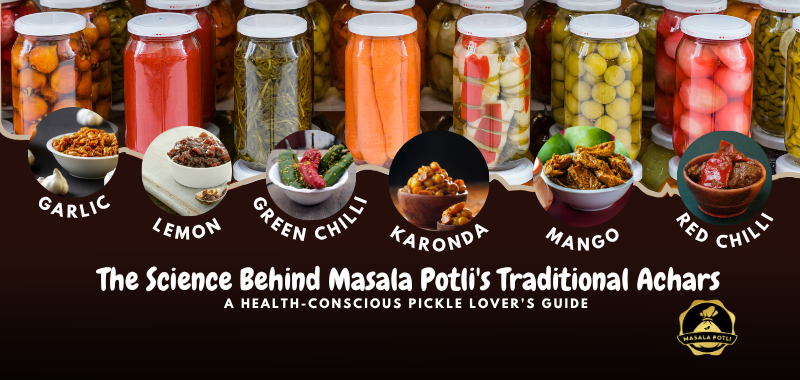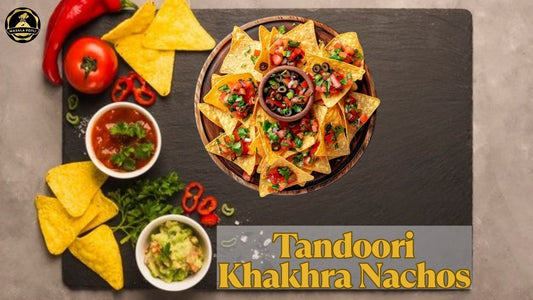In the bustling world of mass-produced condiments, Masala Potli stands out by offering homemade pickles made with traditional recipes, stored in traditional barni (clay pots), and crafted with love using hygienic handmade processes. But beyond the artisanal appeal, what does science tell us about the health implications of these traditional Indian pickles? Let's dive deep into the nutritional science behind Masala Potli's diverse achar collection.
The Masala Potli Difference: Traditional Meets Science
Masala Potli's approach to pickle-making embodies centuries-old fermentation wisdom. Their products are made using time-honored techniques with only the best ingredients, which creates a fundamentally different nutritional profile compared to industrial alternatives. This traditional methodology isn't just about taste—it's about harnessing beneficial fermentation processes that modern science is only beginning to fully understand.
Masala Potli's Fermented Varieties: Probiotic Powerhouses
- Rajasthani Athana Mirchi Achar (Green Chilly Pickle): This traditional green chili pickle represents one of Masala Potli's most potent offerings from a health perspective. The fermentation process transforms fresh green chilies into a probiotic-rich condiment. Green chilies are naturally high in vitamin C and capsaicin, a compound with anti-inflammatory and metabolism-boosting properties. The traditional fermentation process used by Masala Potli likely preserves these nutrients while adding beneficial lactic acid bacteria. https://masalapotli.in/products/rajasthani-athana-mirchi-achar-400-grams
- Khatta Meetha Nimbu Ka Achar (Sweet and Sour Lemon Pickle): Masala Potli's lemon pickle offers unique health benefits through its combination of citrus and fermentation. Lemons provide vitamin C, citric acid, and flavonoids, while the fermentation process may enhance the bioavailability of these compounds. The "khatta meetha" (sweet and sour) balance suggests a controlled fermentation that creates both lactic acid and retains natural fruit sugars. https://masalapotli.in/products/khatta-meetha-nimbu-ka-achar-500-grams
Regional Specialties and Their Nutritional Profiles
- Punjabi Pachranga Mixed Pickle: This mixed vegetable pickle represents nutritional diversity in a single jar. The combination of different vegetables—typically including mango, carrot, turnip, and various seasonal vegetables—creates a complex nutritional profile rich in different vitamins, minerals, and plant compounds. https://masalapotli.in/products/punjabi-pachranga-mixed-pickle-500-grams
- Masala Gajar Ka Achar (Carrot Pickle): Carrots are naturally rich in beta-carotene, which converts to vitamin A in the body. Masala Potli's traditional preparation method likely preserves these carotenoids while the fermentation process may make them more bioavailable. The mustard oil and spice blend add healthy fats that aid in the absorption of fat-soluble vitamins like vitamin A. https://masalapotli.in/products/masala-gajar-ka-achar-500-grams
Specialty Health-Focused Varieties
- Lehsun Ka Achaar (Garlic Pickle): Garlic is renowned for its health benefits, including cardiovascular support, immune system enhancement, and anti-inflammatory properties. Masala Potli's garlic pickle concentrates these benefits while adding probiotic advantages through fermentation. https://masalapotli.in/products/lahsun-ka-achaar-500-grams
The Science of Traditional Preparation Methods
Masala Potli's adherence to traditional methods creates several health advantages:
- Natural Fermentation Process: Unlike mass-produced pickles that may use sodium benzoate for preservation, traditional fermentation creates lactic acid naturally through beneficial bacteria. This process produces probiotics that support digestive health and may influence immune function.
- Quality of Ingredients: The use of Grade 1 mustard oil in many varieties provides superior nutritional quality compared to cheaper alternatives. Grade 1 mustard oil retains more of its natural omega-3 fatty acids and vitamin E content.
- Spice Integrity: Traditional preparation methods preserve the full nutritional profile of spices. Turmeric retains its curcumin content, fenugreek maintains its fiber and compound profile, and mustard seeds preserve their selenium and healthy fat content.
Conclusion: Balancing Tradition with Health Consciousness
Masala Potli's traditional pickles represent a fascinating intersection of culinary heritage and modern nutritional science. Their commitment to authentic preparation methods creates products with genuine probiotic potential and preserved nutritional value—benefits that mass-produced alternatives often lack.




